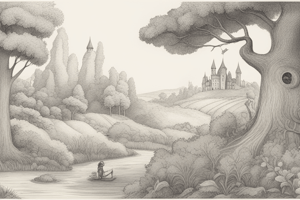Podcast
Questions and Answers
What is one of the primary functions of the respiratory system?
What is one of the primary functions of the respiratory system?
- Sound production (correct)
- Nutrient absorption
- Hormone regulation
- Muscle contraction
The upper respiratory tract includes the trachea and bronchi.
The upper respiratory tract includes the trachea and bronchi.
False (B)
What are the four types of paranasal sinuses?
What are the four types of paranasal sinuses?
Frontal, Ethmoidal, Sphenoidal, Maxillary
The movement of air in and out of the lungs is known as __________.
The movement of air in and out of the lungs is known as __________.
Match the following parts of the respiratory tract with their corresponding function:
Match the following parts of the respiratory tract with their corresponding function:
Which of the following is NOT a function of the respiratory system?
Which of the following is NOT a function of the respiratory system?
The nasal cavity is considered part of the lower respiratory tract.
The nasal cavity is considered part of the lower respiratory tract.
Name one of the paranasal sinuses.
Name one of the paranasal sinuses.
Match the following parts of the respiratory system with their corresponding categories:
Match the following parts of the respiratory system with their corresponding categories:
Flashcards
Respiratory System Function
Respiratory System Function
Gas exchange (oxygen and carbon dioxide), breathing, sound production, sense of smell, and protection from foreign particles.
Upper Respiratory Tract
Upper Respiratory Tract
Part of the respiratory system that includes the nose, nasal cavity, laryngopharynx, and larynx.
Lower Respiratory Tract
Lower Respiratory Tract
Part of the respiratory system that includes the trachea, bronchi, bronchial tree, and lungs.
Paranasal Sinuses
Paranasal Sinuses
Signup and view all the flashcards
Sinusitis
Sinusitis
Signup and view all the flashcards
Breathing
Breathing
Signup and view all the flashcards
Trachea
Trachea
Signup and view all the flashcards
Gas Exchange
Gas Exchange
Signup and view all the flashcards
Bronchi
Bronchi
Signup and view all the flashcards
Lungs
Lungs
Signup and view all the flashcards
Study Notes
Respiratory Tract System
- The respiratory system facilitates gas exchange, allows breathing, produces sound, aids olfaction, and protects from foreign matter.
- Key functions include exchanging oxygen and carbon dioxide, moving air (breathing), and voice production.
- The function also includes assisting the sense of smell (olfaction), protecting the body from dust and microbes through mucus, cilia, and coughing.
Respiratory System Parts
- The respiratory system is composed of upper and lower parts.
- The Upper Respiratory Tract includes the nose, nasal cavity, laryngopharynx, and larynx.
- The Lower Respiratory Tract includes the trachea, bronchi, bronchial tree, and the lungs.
Upper Respiratory Tract
- It encompasses the structures involved in air intake and initial processing before reaching the lungs, such as the nasal cavity.
- Structures include the nasal cavity, pharynx (with its sections: nasopharynx, oropharynx, and laryngopharynx), and the larynx.
Nose
- The nose has important anatomical parts including the dorsum, alae, tip, nostrils (nares) and the columella.
- The nasal cavity has olfactory regions, respiratory regions, and the auditory tube opening.
- External nose components like the dorsum, alae, tip, nostrils, and columella.
Paranasal Sinuses
- Paranasal sinuses include frontal, ethmoidal, sphenoidal, and maxillary air sinuses.
Sinusitis
- Sinusitis involves inflammation of the sinus lining, commonly causing pressure in the facial area.
Pharynx
- The pharynx acts as a conduit for both air and food. The three parts include:
- Nasopharynx: functions only in respiration
- Oropharynx: involved in respiration and digestion.
- Laryngopharynx: passageway for air and food.
Larynx
- The larynx is a cartilaginous structure located between the pharynx and trachea, supporting the voicebox.
Lower Respiratory Tract
- The lower respiratory tract begins past the larynx, including the trachea, bronchi, bronchial tree, and the lungs.
- The trachea is a tube connecting the larynx to the bronchi.
- The trachea branches into two primary bronchi, one for each lung.
- The bronchi further divide into secondary and tertiary bronchi. The bronchi create the bronchial tree.
- Terminal bronchioles lead to alveoli, tiny air sacs where gas exchange takes place.
Lungs
- Lungs have lobes (superior, middle, and inferior) that are further subdivided into smaller units.
- Right lung has 3 lobes, while Left lungs have 2 lobes.
- Pleura membranes surrounding the lungs, vital for smooth lung movement during respiration, consist of visceral and parietal pleura and pleural cavity.
Studying That Suits You
Use AI to generate personalized quizzes and flashcards to suit your learning preferences.




